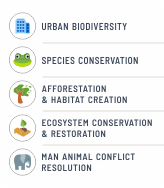


An interactive map showcasing select Biodiversity focussed initiatives of the Tata Group of Companies.
Tata Steel Europe Ltd.
FACILITATING NESTING AND
BREEDING OF COMMON TERNS
BREEDING OF COMMON TERNS
Driven by the commitment to enhance biodiversity at its sites, Tata Steel Europe in North Wales, in collaboration with Merseyside Ringing Group (MRG) transformed lagoons into a nature reserve by providing safe nesting sites for the Common Tern, a vulnerable bird species.
|
Jaguar Land Rover Ltd.
REDEVELOPING THE
ATLANTIC FOREST IN BRAZIL
ATLANTIC FOREST IN BRAZIL
Jaguar Land Rover collaborated with local Brazilian authorities for regeneration of the natural Atlantic forest habitat in Itatiaia by creating a Permanent Protected Area.
|
Tata Chemicals Ltd.
SAVING THE 'VAHLI'
WHALE SHARKS OF GUJARAT
WHALE SHARKS OF GUJARAT
A sudden surge in hunting of the Whale Shark was pushing the species towards extinction. Despite being granted the highest legal protection, saving the Whale Shark needed a massive attitudinal shift among the coastal fishing community. This led Tata Chemicals to launch its one-of-a-kind'Save the Whale Shark' campaign.
|
Tata Chemicals Ltd.
CONSERVING THE 'RAINFORESTS
OF THE SEA' IN MITHAPUR REEF
OF THE SEA' IN MITHAPUR REEF
Tata Chemicals, in collaboration with the Wildlife Trust of India and with support from the Gujarat State Forest Department, successfully increased the live coral cover in the Mithapur Reef.
|
Tata Chemicals Ltd.
ECOSYSTEM TRANSFORMATION
BY MANGROVE PLANTATION
BY MANGROVE PLANTATION
As part of its drive to strengthen coastal ecosystems, Tata Chemicals took up Mangrove Plantation Project at Rukshmani creek site near Dwarka, about 20 km from Mithapur.
|
Tata Motors Ltd.
DEVELOPMENT OF A BIODIVERSITY-
RICH WETLAND ON ROCKY BASALT
In the 1960's, Tata Motors took an unprecedented bold decision to develop a green island next to its factory in Pimpri, even before the manufacturing facilities were set up. Today, this rocky area is covered in a green carpet with 150,000 trees and is home to over 48 bird species and 64 butterfly species.
|
Tata Consulting Engineers Ltd.
BUILDING A GREEN CAMPUS
With the goal of building a campus that responds actively to its natural surroundings, Tata Sons initiated the development of the Tata Management Training Centre in a way that not just meets business objectives, but also contributes to enhancement and conservation of Biodiversity.
|
Tata Consultancy Services Ltd.
CONSERVING URBAN BIODIVERSITY
Tata Consulting Services Ltd. has developed several of its office campuses as Biologically Diversified Urban Landscapes that today are home to over 453 species of flora and 164 species of fauna.
|

Tata Power Ltd.
WESTERN GHATS BIODIVERSITY
HOTSPOT CONSERVATION
HOTSPOT CONSERVATION
Since 1975, Tata Power has undertaken a series of programs to ensure effective biodiversity management within and beyond the purview of their business operations in the Western Ghats.
|
Indian Hotels Company Ltd.
PROTECTING PANNA WITH
THE PARDHI COMMUNITY
THE PARDHI COMMUNITY
Historically, the Pardhi community used to hunt tigers as their core means of livelihood. The Indian Hotels Company Limited (IHCL) collaborated with the Last Wilderness Foundation and the Panna Forest Department to pilot an inclusive tourism model that created alternate livelihood opportunities for the community.
|
Tata Steel Ltd.
BIODIVERSITY MANAGEMENT
AT WEST BOKARO MINES
AT WEST BOKARO MINES
Tata Steel has formulated a comprehensive Biodiversity Management Plan (BMP) replete with multiple initiatives for progressive restoration and enhancement of biodiversity within and around the West Bokaro mines.
|
Tata Projects Ltd.
CREATION OF A FOREST
TO FOSTER BIODIVERSITY
TO FOSTER BIODIVERSITY
Tata Projects' commitment to foster dry and sub-humid land's biodiversity led them to implement Miyawaki technique to create a natural, wild, dense and native forest at their Medchal Plant in an unbelievably short time.
|
Tata Coffee Ltd.
PROTECTING THE 'FARMERS OF
THE FORESTS' IN ANAIMALAI HILLS
To preserve the habitat of the Hornbill, the Tata Coffee Hornbill Foundation successfully minimised the damage caused by habitat modification and fragmentation through multiple strategic reforestation interventions.
|
Tata Coffee Ltd.
CONSERVATION & MANAGEMENT
OF ELEPHANT CORRIDORS IN
COFFEE PLANTATIONS
To protect elephants, prevent human-animal conflicts and ensure safety of people working in coffee plantations at Coorg, Tata Coffee successfully executed a multifaceted strategy comprising innovative technology solutions and out-of-the-box ideas.
|
Kanan Devan Hills Plantations Company (P) Ltd.
An associate company of Tata Consumer Products Ltd.
An associate company of Tata Consumer Products Ltd.
THE SHOLA REGENERATION PROJECT
Driven by the goal of mainstreaming Biodiversity conservation, Tata Tea Limited undertook the Shola Regeneration Project to preserve and revive native species of trees, called shola.
|
















